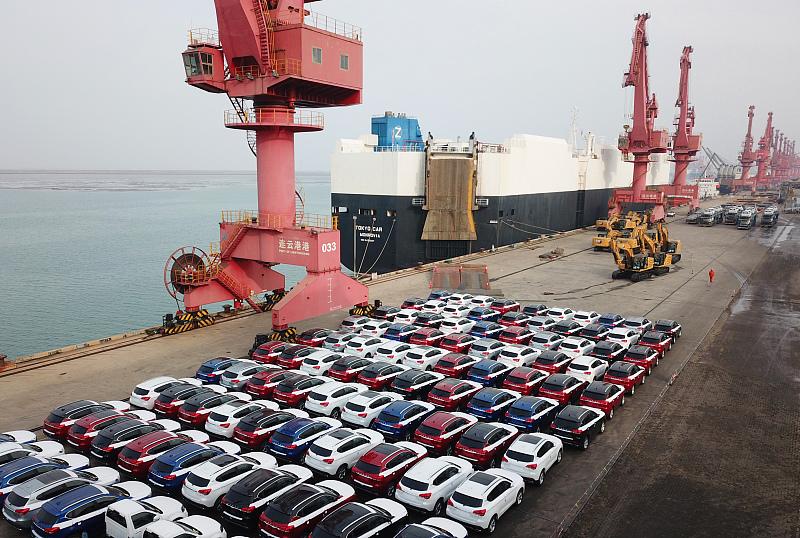Window of opportunity for China-Australia trade relations
- By Hayat Bangash
 0 Comment(s)
0 Comment(s) Print
Print E-mail China.org.cn, February 23, 2023
E-mail China.org.cn, February 23, 2023

Vehicles at Lianyungang Port in Jiangsu province are ready to be exported to Australia in January 2021. [Photo/cfp.cn]
Some positive news is coming from the China-Australia trade front. Trade ministers of the two countries held a video meeting earlier in February and agreed to move forward in bilateral economic relations. China's Minister of Commerce Wang Wentao has said that his country is ready to restart the economic and trade exchange mechanism with Australia, whereas Australian Trade Minister Don Farrell stated that Australia welcomes high-quality investment from China.
The development comes at a time when China has undertaken a post-pandemic policy adjustment to realign its trade and economic activities. Interpreting the updated priorities of the Chinese government and the resumption of consumption during the recent Spring Festival holidays, international markets are upbeat about the growth of the Chinese economy.
Most institutions like the global lender International Monetary Fund, the investment manager Morgan Stanley, and the asset manager Vanguard, to name a few, have raised their projections for the Chinese economy in 2023 to around 6%. As structural reforms in domestic demand and supply and infrastructure investments take shape, China may even outperform these expectations. For Australia, this is precisely the right time to take advantage of its growing international confidence.
The two main areas Wang and Farrell found consensus for expanding cooperation are climate change and new energy. There's no doubt that these emerging areas need a special focus as they provide an arena of shared benefits. Since the impact of climate change will be experienced by everyone, tackling it requires collective and multilateral action. It would be thus encouraging to see the resumption of full-scale sustainable commerce in these areas.
Commentators have called the Chinese and Australian economies "natural partners" and termed the relationship as having "a natural economic affinity." It is important to note that they are also innately complementary to each other. What one country needs is provided by the other. While China is rapidly moving up the industrialization ladder, its demand for resource commodities and energy is increasing. Australia has ample quantities of both. Likewise, Australia needs high-quality finished products, which China can supply in massive quantities.
Both countries also have the advantage of proximity. As compared to American and European markets, transportation and travel times in the Asia Pacific are much faster. And, of course, lesser distances mean lesser costs.
In addition to the call for enhancing mutual trust and resolving differences, Farrell rightly acknowledged during the meeting that China is Australia's largest trading partner. The volume of this trade can be ascertained from the fact recently pointed out by Australian Prime Minister Anthony Albanese that Australia's trade with China is greater than its next three largest trade partners combined.
At the policy-setting 20th National Congress of the Communist Party of China held in October last year, the continuation of China's opening up to the wider world was given a special emphasis. Congress resolved to make the opening up of a high standard and integrate it with the development plans of other countries.
This is where Australia's complementary economy comes into the picture. As China continues to open up new sectors for foreign investment, Australia's public and private entities can capitalize on early bird incentives.
At the same time, caution must be taken to avoid the stance of the previous Australian government, which put ice on bilateral relations for a couple of years. The actions taken at that time, at the behest of extra-regional entities, caused extensive losses for Australian exporters. Australia should be on the watch for third parties influencing its trade policies with China and should strive to uphold prudent and independent practices. The growth of the Australian economy strongly relates to how Australia balances its relations with major powers.
It was welcoming to see a realization in this regard, such as during a recent joint press conference on Feb. 7 by the Australian and New Zealand Prime Ministers. The former rightly identified that maintaining good economic relations and trading with China is in Australia's national interest.
China is watching the tightened reviews of Chinese companies' investments in Australia. If Australia provides them with a fair and level playing field, they will be able to bring in capital helpful to accelerating Australia's post-pandemic economic recovery.
The recent talk can be seen as a window of opportunity for bilateral trade and economic relations between Australia and China, and both sides can benefit from the budding environment before third parties potentially attempt to introduce new detracting factors.
Bilateral relations are back at this level after considerable deliberations. Leaders of the two countries met at the sidelines of the G20 summit last November, and foreign ministers met in Beijing last December. The latest video meeting between the trade ministers and its fruitful outcome has set the path for a full resumption of economic and trade activities. This impetus in trade and diplomatic relations should not be lost.
Hayat Bangash is a freelance columnist on international affairs with degrees in business administration and war studies.
Opinion articles reflect the views of their authors, not necessarily those of China.org.cn.
If you would like to contribute, please contact us at opinion@china.org.cn.





